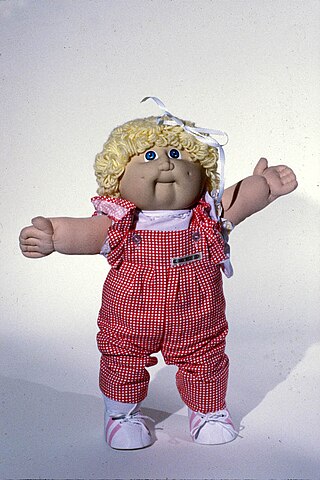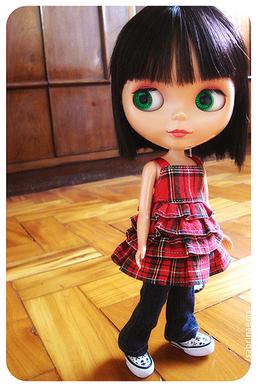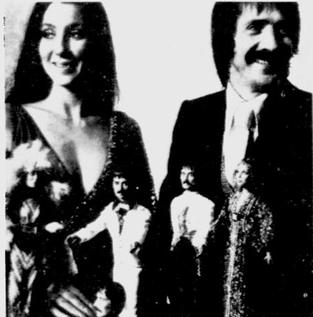
Cabbage Patch Kids are a line of cloth dolls with plastic heads first produced by Coleco Industries in 1982. They were inspired by the Little People soft sculptured dolls sold by Xavier Roberts as collectibles. The brand was renamed 'Cabbage Patch Kids' by Roger L. Schlaifer when he acquired the exclusive worldwide licensing rights in 1982.

A doll is a model typically of a human or humanoid character, often used as a toy for children. Dolls have also been used in traditional religious rituals throughout the world. Traditional dolls made of materials such as clay and wood are found in the Americas, Asia, Africa and Europe. The earliest documented dolls go back to the ancient civilizations of Egypt, Greece, and Rome. They have been made as crude, rudimentary playthings as well as elaborate art. Modern doll manufacturing has its roots in Germany, from the 15th century. With industrialization and new materials such as porcelain and plastic, dolls were increasingly mass-produced. During the 20th century, dolls became increasingly popular as collectibles.
The Mego Corporation is an American toy company that in its original iteration was first founded in 1954. Originally known as a purveyor of dime store toys, in 1971 the company shifted direction and became famous for producing licensed action figures, celebrity dolls, and the Micronauts toy line. For a time in the 1970s, their line of 8-inch-scale action figures with interchangeable bodies became the industry standard.

Blythe is a fashion doll, about 28 cm (11 inch) tall, with an oversized head and large eyes that change color with the pull of a string. It was created in 1972 and was initially only sold for one year in the United States by toy company Kenner. In 2001, the Japanese toy company Takara began producing new editions of Blythe dolls. There is a network of hobbyists who customize the doll for resale and create clothing and shoes for Blythe. Enthusiasts share photographs of their work and other types of dolls on the Internet.

The Lonely Doll is the first children's book in a series by photographer and author Dare Wright. The story is told through text and photographs. It was first published by Doubleday in 1957, went out of print for years, was reissued by Houghton Mifflin in 1998, and brought out by Barnes & Noble in a narrated version for their Nook eReader in 2012. Wright wrote 10 books starring Edith and the bears. The nine that have been reprinted are The Lonely Doll, Edith and Mr. Bear, A Gift from the Lonely Doll, Holiday for Edith and the Bears, The Doll and the Kitten, Edith and the Duckling, Edith and Little Bear Lend a Hand, Edith and Midnight and The Lonely Doll Learns a Lesson.

Crissy was an American fashion doll with a feature to adjust the length of its hair. Crissy was created in the Ideal Toy Corporation's prototype department in 1968.

Fashion dolls are dolls primarily designed to be dressed to reflect fashion trends. They are manufactured both as toys for children to play with and as collectibles for adults. The dolls are usually modeled after teen girls or adult women, though child, male, and even some non-human variants exist. Contemporary fashion dolls are typically made of vinyl or another plastic.

Tammy was a 12" fashion doll created by the Ideal Toy Company that debuted at the 1962 International Toy Fair. Advertised as "The Doll You Love to Dress", Tammy was portrayed as a young American teenager, more "girl next door" than the cosmopolitan image of Mattel's Barbie, or American Character's Tressy.

Sindy is a British fashion doll created by Pedigree Dolls & Toys in 1963. A rival to Barbie, Sindy's look and range of fashions and accessories made her the best-selling toy in the United Kingdom in 1968 and 1970. After Marx Toys' unsuccessful attempt to introduce Sindy in the United States in the late 1970s, Hasbro bought the rights to Sindy and remodelled the doll to look more American. As a result, the doll's popularity declined; in addition Barbie manufacturer Mattel filed a lawsuit for copyright infringement, which was settled when Hasbro agreed to remodel Sindy's face. During the 1990s, Barbie's share of the doll market continued to grow while Sindy's diminished, which led to Sindy being delisted from major retailers in 1997. Hasbro returned the doll's licence to Pedigree, and the doll was relaunched in 1999, manufactured by Vivid Imaginations. Sindy's 40th anniversary in 2003 saw a new manufacturer, New Moons, and another relaunch and redesign. There were further relaunches in 2016 by Tesco and in 2021 by Kid Kreations.

Gene Marshall is a 15.5 inch tall collectible fashion doll inspired by Hollywood's Golden Age. It was created by the illustrator Mel Odom. Each doll features an intricate movie-styled theme based upon fashions from the 1930s, 1940s and 1950s as well as Hollywood's version of historical costuming.
A Black doll is a doll of a black person. Black doll manufacture dates back to the 19th century, with representations being both realistic and stereotypical. More accurate, mass-produced depictions are manufactured today as toys and adult collectibles.
Kitty Collier is a doll created by Robert Tonner and is marketed to mainstream doll collectors.

The Sonny & Cher dolls were a collection of 12-¼ inch high celebrity doll likenesses of pop rock duo Sonny & Cher. The line was released by Mego Corporation in 1976. The release of these fashion dolls coincided with the popularity of The Sonny & Cher Show prime time variety TV show.
Robert Tonner is an American entrepreneur, fashion designer, sculptor, doll artist and owner of Tonner Doll Company, Inc. and the Effanbee Doll Company, Inc.
Tonner Doll Company, Inc. was a collectible doll design and distribution company located in Kingston, New York. Founded by Robert Tonner in 1991, Tonner Doll designed and marketed original doll lines, as well as a number of licensed dolls for films such as Harry Potter, Spider-Man 3, and Twilight. Its original products included the Tyler Wentworth, Kitty Collier, and Antoinette series.
Jozef Szekeres is an Australian artist, animator, writer, toy designer, sculptor, creative director, arts lecturer, and a director of the Black Mermaid Productions creative team based in Australia. He is best known for his doll creation Elizabet Bizelle, launched through his company Jozef Szekeres Dolls in 2003. He was a finalist in the 2011 Australian Cartoonist Association Stanley Awards, with nominations for Best Australian Illustrator and Australian Comic Book Artist.

R. John Wright Dolls is an art doll making workshop located in Bennington, Vermont. Established in 1976, R. John Wright Dolls (RJW) is a privately held company founded by R. John Wright.
Integrity Toys is a toy company that designs and markets fashion and celebrity dolls and related accessories, with a focus on high-end fashion dolls. Integrity Toys was founded in 1995 by Percy Newsum. Integrity Toys is a privately held company located at 100 Chestnut Springs Road in Chesapeake City, Maryland.
Marjory Fainges is an Australian researcher and historian on the subject of the Australian Toy Industry over the last 100 years in particular the commercial manufacture of dolls. She has written 16 books and is a doll judge of antique, collectible, modern and artist dolls and she has lectured internationally.

Bertha "Beatrice" Alexander Behrman, known as Madame Alexander, was an American dollmaker. Founder and owner of the Alexander Doll Company in New York City for 65 years, she introduced new materials and innovative designs to create lifelike dolls based on famous people and characters in books, films, music, and art. Among her notable creations were the Scarlett O'Hara doll, the Dionne quintuplets dolls, and a 36-doll set of the royal family and their guests at the 1953 coronation of Queen Elizabeth II. During her stewardship, the company produced more than 5,000 dolls, many of which became collector's items.












